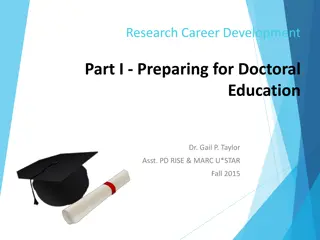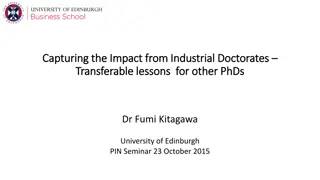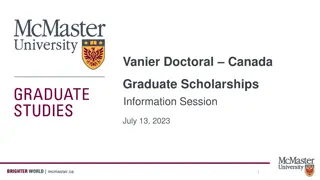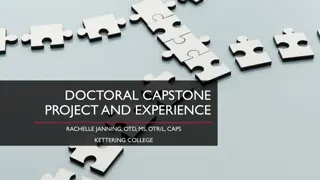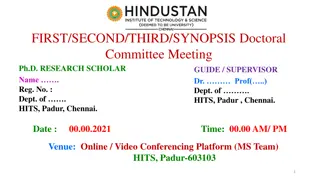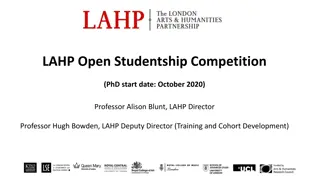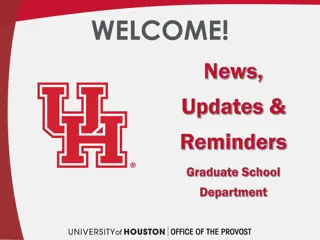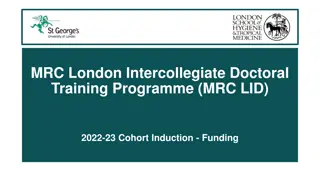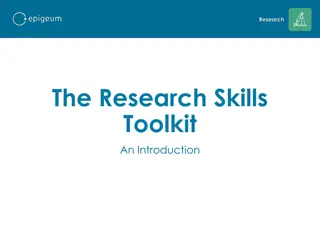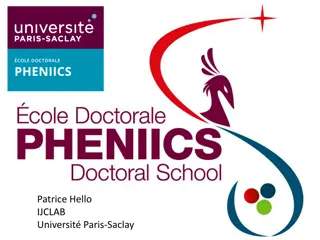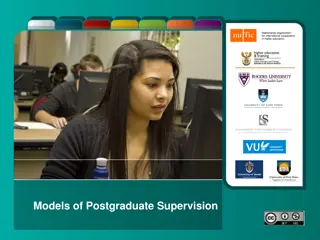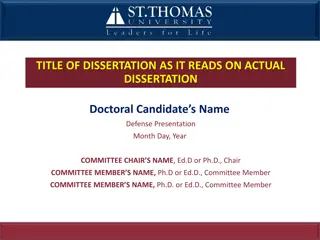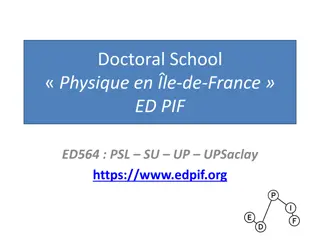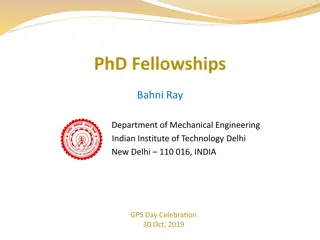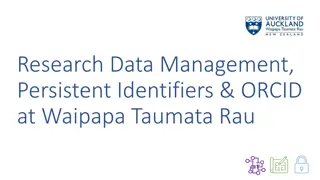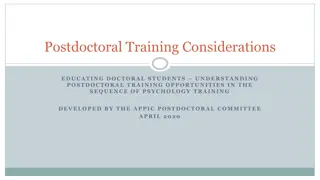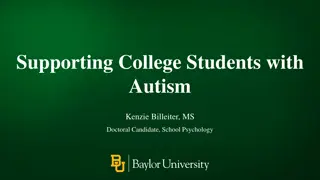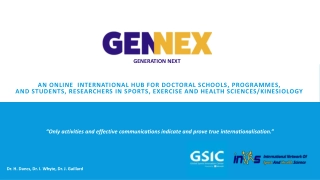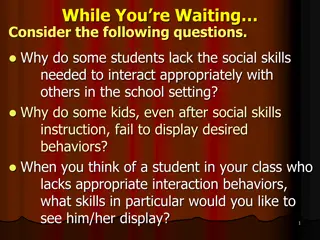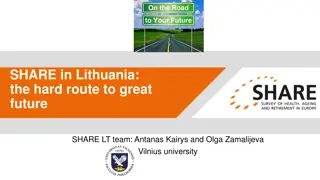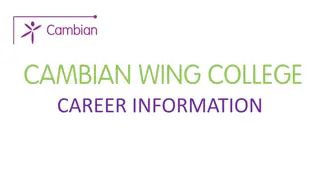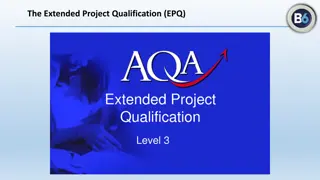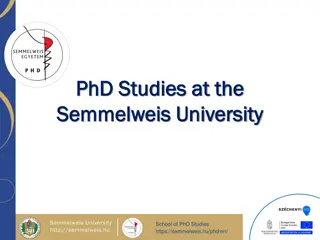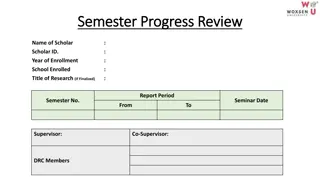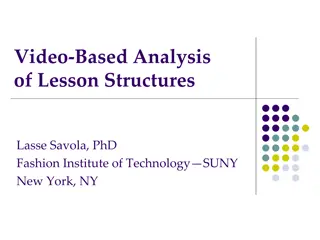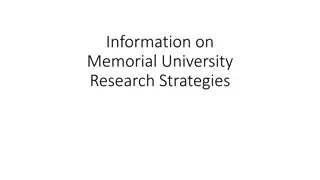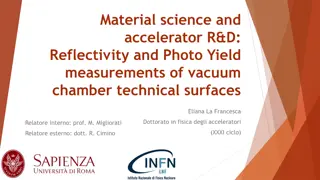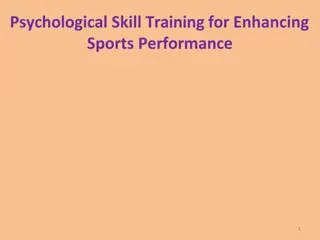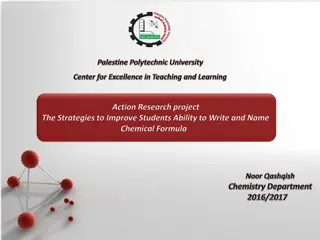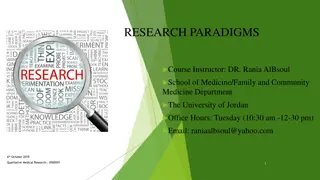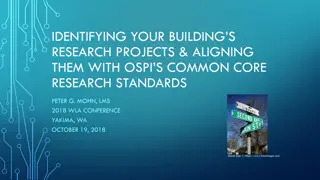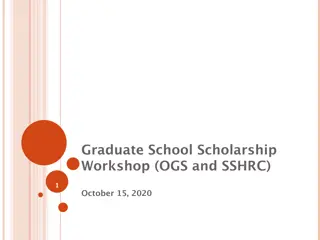Enhancing Research Skills for Online Doctoral Students
Dr. Ryan Rominger discusses using Praxis courses and Online QDAS to train geographically distributed novice qualitative and mixed-method researchers. The presentation focuses on teaching research methods to doctoral students, incorporating practical skills, online QDAS software, and continuous improvement models. The background covers prior teaching experiences and the motivation behind the presentation. The aim is to enhance the research skills of online doctoral students through innovative teaching approaches.
Download Presentation

Please find below an Image/Link to download the presentation.
The content on the website is provided AS IS for your information and personal use only. It may not be sold, licensed, or shared on other websites without obtaining consent from the author. Download presentation by click this link. If you encounter any issues during the download, it is possible that the publisher has removed the file from their server.
E N D
Presentation Transcript
USING PRAXIS COURSES AND ONLINE QDAS TO TRAIN GEOGRAPHICALLY DISTRIBUTED NOVICE QUALITATIVE AND MIXED-METHOD RESEARCHERS RYAN ROMINGER, PH.D. LCPC-PIT ASSOCIATE CHAIR, CENTER FOR LEADERSHIP STUDIES AND EDUCATIONAL RESEARCH, COLLEGE OF DOCTORAL STUDIES, UNIVERSITY OF PHOENIX
DEFINITIONS Praxis course: A course in which practical skills are learned and practiced, often live research where the faculty is the primary researcher. Online QDAS: A qualitative data analysis software which can be accessed online, through the internet. Also referred to as QDAP, or qualitative data analysis program, and CAQDA, or computer assisted qualitative data analysis. Geographically distributed: Researchers who reside in different parts of the country or world and are unable to meet in person to collect and analyze data together. Novice researchers: Here, read dissertation student , as this presentation will focus on my work as a professor teaching doctoral students. However, this could apply to anyone who is new to qualitative research methods.
BACKGROUND Sofia University (formerly the Institute of Transpersonal Psychology) Taught doctoral students 10 years Face-to-face and online/hybrid programs Main focus was research methods, including theory and praxis courses Praxis courses: Action research, hermeneutical, art-based research methods, mixed method research Topics ranged from diversity in graduate programs, integrating significant life events, and exploring the clinical relationship Sage Publications 2 years Methods in Research project reviewed proposals re: evaluate methods
WHY THIS PRESENTATION? Continuous Improvement Model how can we continue to improve our craft of teaching? Past 3 years helped teach Knowledge Without Boundaries Academy events at University of Phoenix Teach research methods policies and procedures to faculty and doctoral students Continually evaluating how we conveyed our research material, how it was received, and how to improve the KWBA events Co-leading (w/ Dr. Mansureh Kebritchi and team of methodologists) Research Methodology Special Interest Group (SIG) in the College of Doctoral Studies (formerly School of Advanced Studies) at UOPX Team of methodologist, leading webinars, providing resources on methods Action Research whereby we are evaluating our impact on faculty, students, SAS Incidentally, Drs. Mark McCaslin, Mansureh Kebritchi, & I are also engaged in study on student success in online practitioner oriented doctoral programs ..
SO. I have been thinking about teaching research methods for quite a while! Question: How can we enhance research skills of our online doctoral students? (set the ferrets to work)
SKILLS What skills are needed by qualitative & mixed method researchers? Obvious: method specific skills i.e., Phenomenology bracketing, in-depth descriptive interviewing, differentiating interpretations, horizontalization Heuristics acknowledging positionality & experience with topic without getting lost in your own story, vs auto- ethnography Art-based research ability to engage artistic or expressive arts processes with individuals or groups, and hold space for non-verbal communication of data /themes Narrative embed oneself in constructivism, narrative interviews, identify narrative elements Mixed methods conceptualize separate strands (Quant/Qual), where to bring strands together (data collection or analysis), understand how synthesizing results provides larger view of original research problem Often taught in specific methods courses
SKILLS Less Obvious Meta-skills (transcend methods may not be method specific) i.e., project management budgeting (for those with grants) Interview skills Coding of data And MORE .. Understood, specific types of coding or interviewing may be method specific i.e., a narrative interview may be different than a phenomenological interview
SKILLS Esoteric, transpersonal, or characterological skills Anderson and Braud (2011), two research methodologists, 3 of 10 critical integral research skills within the human sciences and humanities includes: Working with intention Quieting and slowing Working with attention Auditory skills (listening to others and own reactions/memories to sound) Visual skills, imagery, visualization, imagination Kinesthetic skills (gross & subtle movements) Proprioceptive skills (paying attention to visceral/muscular) Direct knowing, intuition, empathic identification Accessing unconscious processes and materials (often in liminal or altered states) Play and the creative arts (novelty, creativity & notice mind) (italics in original; pp. 163-164) Grit, Perseverance, Flexibility, Tolerance of the Unknown/Chaotic Situations, Convergent + Divergent Thinking, Abstract + Concrete, or Sensate + Intuitive Thinking, etc.
WHAT SKILLS ARE NECESSARY TO TEACH? Please take 5-7 minutes to discuss at your table: What meta-skills does a novice researcher need to learn in order to be successful? **Note handout: Use first column to keep track of the skills you come up with, and check box as to if skill is better taught online or F-2-F**
COMMON SKILLS/GROUPS OF GENERAL SKILLS Research conceptualization Define topic, gap/opportunity, research question, significance, ethical considerations, choosing an appropriate method, writing up a proposal, going through IRB and other procedures Data collection Connecting with/recruiting participants, interviewing/surveying/administering tests, using online systems (Survey Monkey), using video/telephone conferencing, Data Analysis Coding, running statistics, generating categories/themes, linking themes/outcomes to original research questions, linking themes/outcomes to larger literature/research Producing Final Product presentation, article, dissertation writing, communication METHOD SPECIFIC VS GENERAL SKILLS
WHAT ABOUT OTHER META-SKILLS? Mindfulness A practice on behalf of the researcher promoting openness, awareness, non-judgment (see my other presentation: The Many Faces of Mindfulness in Qualitative Research") Reflexivity Ability to reflect critically upon oneself, one s own biases/perspectives/positionality, understand and communicate these reflections in relation to one s research Passion, Motivation, & Commitment After all, the research process can be challenging! **Are these skills or traits, and can they be taught or cultivated?**
DIFFICULTY WITH ONLINE PROGRAMS/COURSES Difficult to generate deep dialogue regarding skills or methods Usually resort to students posting an answer to faculty question/topic, with little interaction Better when using videoconferencing and/or video posts/responses (Angel LMS-->Blackboard) While theory might be conveyed, practice of skills may be difficult Students may be hands-on learners, which may require data sets Students may not have necessary software (QDAS) If they have software, quarter/semester may be too packed for quickly learning software for basic method courses Not to mention, differences in software Being online, students may feel less supported when they encounter difficulties (can t sit down with proff or other students and go over assignment, in person, which some students are used to)
ADVANTAGES OF ONLINE PROGRAMS/CLASSES Link to resources within the classroom (breadth vs depth? Can it be breadth AND depth?) Utilize online platforms for communication (video, teleconference WebEx, Zoom, Skype, etc.) Utilize online QDAS to: Demonstrate coding and analysis (will get to this in a moment in more detail) Practice coding data sets easily duplicated within QDAS Collaborate through cloud-based document hosting Google Docs To co-author articles for class Online students may be more comfortable working with online data collection and analysis platforms than face-to-face students ( dated assumption?)
PRAXIS COURSES Praxis courses: Can be LIVE research or use previously collected data Goal is to engage novice researchers (students) with actual research projects Students learn skills while under guidance of faculty In LIVE research, students may be more focused, knowing they are contributing to real research outcomes (my experience) Early in development of praxis course, students may contribute to helping define the topic, gap/opportunity, research questions, etc. all the way through passing IRB Some projects can even be student led/inspired Students can be on teams or solo, building skills (interviewing, coding, theming, analysis, synthesis) through engaging the data Integrated into Program Curriculum meet program goals of teaching research skills to novice researchers Could also advance the research agenda of the faculty members, and professional standing of the students if published
EXAMPLE PRAXIS COURSE Have led F-2-F, hybrid, and purely online praxis courses For hybrid and online, I find meeting at least once in person helps a great deal best if at the start of the course or each quarter it is offered ITP/Sofia we had 2-3 (depending on the year) quarters; usually a year long commitment, and some continued longer
HEURISTIC, ARTS-BASED RESEARCH: IMPACT OF SIGNIFICANT LIFE EVENTS (SLE) I had passed study proposal through IRB prior to start of class First, in F-2-F residency, students were introduced to topic (which was familiar), then students practiced interviewing each other (transcribe later). Students continued with literature to orient themselves while also reading about the research method. Completed rest of research cycle including writing a mock article at the end based on their analysis of at least 3 participants data **Of the various skills, learning to interview especially with expressive arts was important to do in person** Input data into Dedoose, an online web-based qualitative data analysis software/program. In Dedoose, students practiced coding interviews & art-based data In online class we discussed coding, refined coding process, discussed readings such as Saldana s text on coding much more we could have done with current Dedoose such as interrater reliability to check coding
SPECIFIC SKILLS LEARNED BY NOVICE RESEARCHERS 1. Position study within larger literature 2. Collect interview, survey, and expressive art data [interview skills, recording media, transcription] 3. Upload data into QDAS (MMDAS mixed method); learn computer systems that will help with dissertation/future research 4. Code data fragments reflexivity, linking, 5. Generate conversation/idea generation among research team (memos, online in class); build communication skills and learning to work with a research team 6. Analyze data numerous ways (using charts & graphics, demographics/descriptors, etc.) 7. Generate categories/themes meta-analysis, connecting results to larger literature base 8. Generate research report (intro, method, results, discussion sections)
BACK TO HANDOUT Look at skills you listed as important (if you didn t list any, consider what skills are important for qual researchers) Discuss at your table: What online resources might help teach the skill listed? How can you integrate these into a praxis course? Use right hand column to list resources for your main skills You can use this list, hopefully with a few new resources, in your future classes
CONCLUSION Using praxis courses and online qdas to train geographically distributed novice qualitative and mixed-method researchers Clearly different types of praxis courses will be able to use different resources (Survey Monkey, Dedoose, Nvivo, HyperResearch, SPSS, WebEx, Skype, etc.) depending on school and student resources Also, skills to be practiced may depend on where study is at in the cycle i.e., studies just beginning may train students to write up proposals, and those just completing help train students to write reports Geographic distribution need not be a detriment there are ways of connecting research teams, but need to be clear, consistent, and relatively competent with the system being used to connect your teams! Helps to have a topic students/novice researchers can become excited about! (in my school, SLEs for example) While instructor is teaching and building skills, she or he can also learn along with the students! Demonstrates that the research endeavor is exploratory and/or explanatory, generating new understanding of our world, and that one main purpose of research is to ask questions (including specific research questions) which one hopes to answer.
Questions? Send correspondence to Ryan Rominger, Ph.D. LCPC-PIT at drryanrominger@gmail.com




